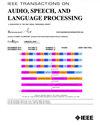一种对称核偏最小二乘框架用于说话人识别
IEEE Transactions on Audio Speech and Language Processing
Pub Date : 2013-07-01
DOI:10.1109/TASL.2013.2253096
引用次数: 13
摘要
i向量是说话人特征的简洁表示。近年来,在i向量相关的研究中,利用它们捕捉说话人和通道变化的能力来开发高效的自动说话人验证(ASV)系统。i-向量空间中说话人之间的关系是非线性的。完成有效的说话人验证需要对这些非线性进行良好的建模,并且可以将其视为机器学习问题。核偏最小二乘(KPLS)可以用于i向量空间的判别训练。然而,该框架存在训练数据不平衡和评分不对称的问题。我们使用“一次性相似性评分”(OSS)来解决这个问题。最终的ASV系统(OSS-KPLS)在NIST SRE 2010扩展核心数据集的几个条件下进行了测试,并与最先进的系统进行了比较:联合因子分析(JFA)、概率线性判别分析(PLDA)和余弦距离评分(CDS)分类器。改进显示。本文章由计算机程序翻译,如有差异,请以英文原文为准。
A Symmetric Kernel Partial Least Squares Framework for Speaker Recognition
I-vectors are concise representations of speaker characteristics. Recent progress in i-vectors related research has utilized their ability to capture speaker and channel variability to develop efficient automatic speaker verification (ASV) systems. Inter-speaker relationships in the i-vector space are non-linear. Accomplishing effective speaker verification requires a good modeling of these non-linearities and can be cast as a machine learning problem. Kernel partial least squares (KPLS) can be used for discriminative training in the i-vector space. However, this framework suffers from training data imbalance and asymmetric scoring. We use “one shot similarity scoring” (OSS) to address this. The resulting ASV system (OSS-KPLS) is tested across several conditions of the NIST SRE 2010 extended core data set and compared against state-of-the-art systems: Joint Factor Analysis (JFA), Probabilistic Linear Discriminant Analysis (PLDA), and Cosine Distance Scoring (CDS) classifiers. Improvements are shown.
求助全文
通过发布文献求助,成功后即可免费获取论文全文。
去求助
来源期刊
自引率
0.00%
发文量
0
审稿时长
24.0 months
期刊介绍:
The IEEE Transactions on Audio, Speech and Language Processing covers the sciences, technologies and applications relating to the analysis, coding, enhancement, recognition and synthesis of audio, music, speech and language. In particular, audio processing also covers auditory modeling, acoustic modeling and source separation. Speech processing also covers speech production and perception, adaptation, lexical modeling and speaker recognition. Language processing also covers spoken language understanding, translation, summarization, mining, general language modeling, as well as spoken dialog systems.

 求助内容:
求助内容: 应助结果提醒方式:
应助结果提醒方式:


